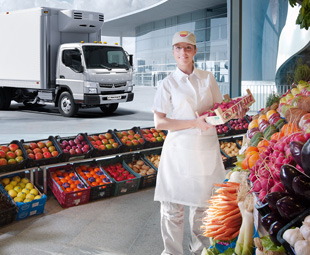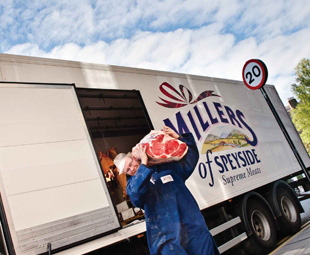Freezing time

Andrew Crafford, business development director at Imperial Logistics Refrigerated Services (ILRS), and Francois van der Westhuizen, national sales manager – transport, for GEA Refrigeration Africa, speak to us about transporting fresh produce.
“Hurry! I never hurry. I have no time to hurry,” said Russian-born United States composer, Igor Stravinsky. He was taking his time, however, writing music, in an era when motorised transport was just getting into its stride and the domestic household refrigerator cost more than a Ford Model T!
For the modern fresh-produce transporter, such as ILRS, time and being in a hurry are what the game is all about.
“It’s all product-specific, though,” says Crafford. “So dairy would have a different time window to meat. You need to ensure planning is effective, so that loading or offloading does not result in a constraint. It is all about being on the clock!”
Crafford says that speed to market, loading and unloading times and on-time arrivals are central to a successful supply chain. However, what happens if a truck breaks down? “Speed of recovery is of the essence here, so a replacement or alternative vehicle needs to be despatched hastily. The effective insulation of the fridge bodies ensures that the product remains intact – for a period. It’s crucial to ensure that effective preventative maintenance programmes on the fridge units and trailer are undertaken.”
In this area, monitoring and tracking are essential. “It’s advisable to use remote temperature monitoring and vehicle tracking,” says Crafford. “Effective maintenance is also imperative to ensure total cold chain integrity.”
 Van der Westhuizen says that correct specifications and correct operating set-up parameters, using best practice loading processes, will allow operators to get the most from their refrigeration units. And there are many considerations to bear in mind …
Van der Westhuizen says that correct specifications and correct operating set-up parameters, using best practice loading processes, will allow operators to get the most from their refrigeration units. And there are many considerations to bear in mind …
“You need to be cognisant of the size of the load body and its type of insulation. How many door openings will happen during a day, and what is the travelling distance and time between them?
“What will the average ambient temperature be, and what temperature will be required? You may need multi-temperature compartments to distribute either fresh or frozen products … What product will be transported?” he begins.
Absolute freshness, notes Crafford, starts with the inbound food supplier: “The correct sourcing, and ensuring the manufacturing and production process are best in class, ensure product quality; for example, adhering to ISO or HAZAP-type standards.”
What about the transporter? “Hygiene standards need to be maintained at all times! Every efficient supply chain professional will tell you to try to limit the number of ‘touches’ a product encounters,” Crafford notes. If this is not done, it is likely that the product will be rejected, which will result in massive waste within the overall supply chain. Should any consumers suffer ill health from contaminated food, the result could be serious reputational damage.
Vehicles must, therefore, be clean enough to eat out of … “Regular cleaning of the inside of the truck bodies is undertaken using food-grade cleaning materials, and microbial growth is prevented by swabbing and sanitising. Maintenance of the cold chain ensures all the preventative maintenance is carried out effectively and on time. This means not missing any of the scheduled maintenance programmes,” says Crafford.
Van der Westhuizen notes that it is important for there to be a support network between major hubs, should something go wrong with the refrigeration unit. “You want to asses the reliability, service intervals, fuel consumption and carbon emissions, as well as the lifecycle costs of the refrigeration units you fit to your vehicles.”
Managing these aspects of the supply chain will ensure absolute freshness, and that your transport operation stands the test of time!
Published by
Focus on Transport
focusmagsa




